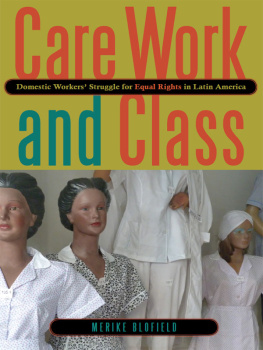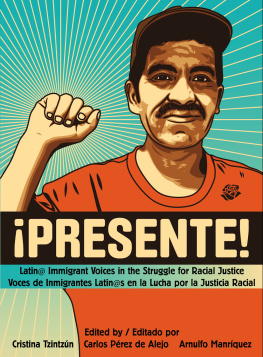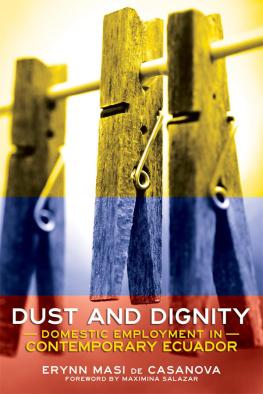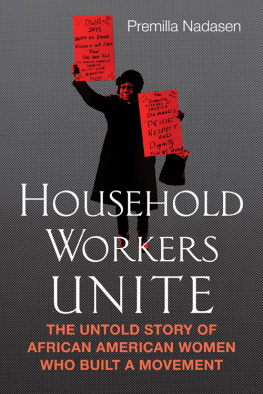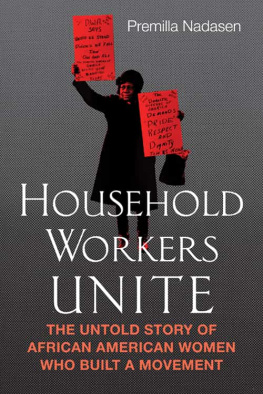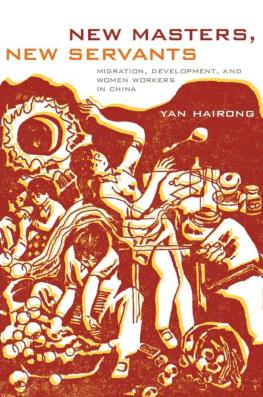Some of the material found in ,
and first appeared in Merike Blofield, Feudal
Enclaves and Political Reforms: Domestic Workers in
Latin America, Latin American Research
Review 44, no. 1 (2009): 15890.
Library of Congress Cataloging-in-Publication Data
Blofield, Merike.
Care work and class : domestic workers struggle for equal rights
in Latin America / Merike Blofield.
p. cm.
Includes bibliographical references and index.
Summary: Examines the movement for labor reform among domestic workers in
Latin America. Explores how domestic workers mobilization, strategic alliances, and
political windows of opportunity can lead to improved rightsProvided by publisher.
ISBN 978-0-271-05327-1 (cloth : alk. paper)
1. Household employeesLatin AmericaSocial conditions.
2. Social classesLatin America.
3. EqualityLatin America.
4. Industrial relationsLatin America.
5. Labor movementLatin AmericaHistory21st century.
I. Title.
HD8039.d52b56 2012
331.7'6164098dc23
2011043058
Copyright 2012
The Pennsylvania State University
All rights reserved
Printed in the United States of America
Published by
The Pennsylvania State University Press,
University Park, PA 16802-1003
The Pennsylvania State University Press is a member
of the Association of American University Presses.
It is the policy of The Pennsylvania State
University Press to use acid-free paper. Publications
on uncoated stock satisfy the minimum requirements
of American National Standard for Information
SciencesPermanence of Paper for Printed
Library Material, ansi z39.481992.
This book is printed on Natures Natural,
which contains 50% post-consumer waste.
The idea for this book was born during field research for my previous project. I visited the home of an upper-class conservative Catholic political activist in Chile for an interview. We sat in her sloping garden, where she rang a bell for the maid to bring coffee. She elaborated on the difficulties of balancing different interests in womens rights and used the example of domestic violence and the importance of family unity in poor families. Her maid, she told me, had a physically abusive husband. Were he prosecuted and jailed, the familys income would decline, and thus it was better to keep the offender at home. For the woman I was interviewing, the solution was not public involvement through services such as safe houses or even a personal responsibility on her part as the womans employer, but rather to keep the violent offender in the home because of his financial contribution to the family household.
I was struck by this comment, juxtaposed with a gorgeous setting where the same victim of domestic violence served us coffee, and it made me keenly aware of the enormous social distance between the employer and her employee. Would she have advocated a similar solution to the women in her circles? Perhaps, but probably not.
Several years later, I began to look into the topic of domestic workers in Latin America and found that very little had been written on this sector of workers, especially from a social scientific perspective. On the other hand, as I would mention my emerging topic to friends, acquaintances, and students in or from the region, I was struck by how often people told me, In Latin America, everyone has a maid. This comment intrigued me, as it quite clearly delineated the boundaries of everyone and reflected the simultaneous ubiquity and invisibility of the women who work in this occupation. I decided to investigate the laws, policies, and politics that surround this sector, and this book is the result. Even though the book is driven by normative concerns (of social equity), it is an empirical investigation into the political dynamics of domestic workers rights. As it went to press, the ILO passed a convention on domestic workers rights. This book examines the politics up to the convention and discusses the implications of the convention in the conclusion.
I would like to thank Sandy Thatcher for encouraging me to write this book. His enthusiasm convinced me that a book on this topic could and should be published. He brought me to Penn State University Press, and while he is no longer its director, I am grateful for his guidance and for the opportunity to publish with the press.
There are many others to thank. During my field research, many individuals were kind enough to open doors for me, to give me interviews, and to share their research with me. I would especially like to thank Betty Pinto in Bolivia, Pamela Farias in Chile, Juliana Martnez Franzoni in Costa Rica, and Fernando Filgueira in Uruguay. Institutionally, I would like to thank FLACSO-Chile and the University of Costa Rica. I am grateful to the Haas-Haesly family, who generously let me stay with them in Costa Rica, especially to Xavier, who, as a result, had to share a room with his baby sister for two weeks. Thank you also to the University of Miamis Research Support Award for funding a bulk of my field research trips.
I would like to thank the University of Miami political science colloquium participants for giving me several opportunities to share my research. For feedback on chapter drafts, I would like to thank Felipe Agero, Louise Davidson-Schmich, Claudio Fuentes, Elise Giuliano, Liesl Haas, Kristen Hill Maher, Casey Klofstad, Gregory Koger, Juan Pablo Luna, Christopher Mann, Juliana Martnez Franzoni, Maria Victoria Murillo, Joseph Parent, Mari Peepre, and Bill Smith. Jennifer Pribble provided especially helpful comments on the final draft of the manuscript. In addition, Evelyne Huber has always been very generous with her professional and intellectual advice.
I would also like to thank the anonymous reviewers at Penn State University Press for their very helpful comments. The detailed and insightful feedback of Reviewer #2 in particular helped me clarify my argument, and I express my gratitude to this anonymous person, if he or she picks up this book again. Alicia de Leon Bonilla, Susie Carballo, and Sivan Goobich provided able research assistance. Thank you to Drucilla Scribner for taking the photograph of the maids uniform store in Buenos Aires for the book cover, and to Julie Schoelles at Penn State for being an efficient, meticulous, and friendly copyeditor.
Finally, I am grateful for the support of my family and close friends, and especially of my husband, Matthias Dietrich. He may not have realized what he was getting into by becoming involved with an academic but amazingly enough decided to stick with it and helps me put things into perspective.

